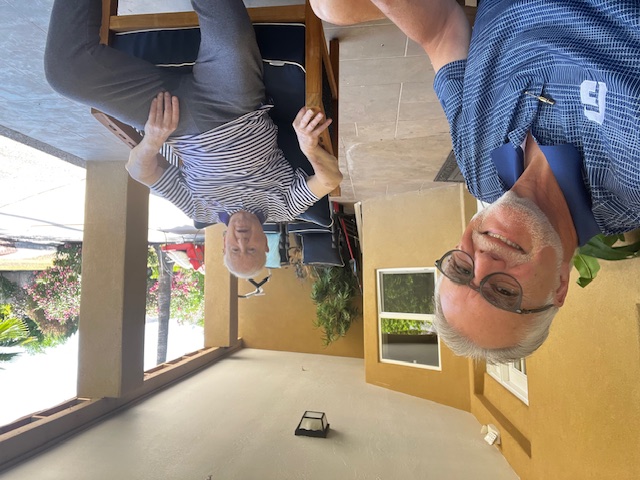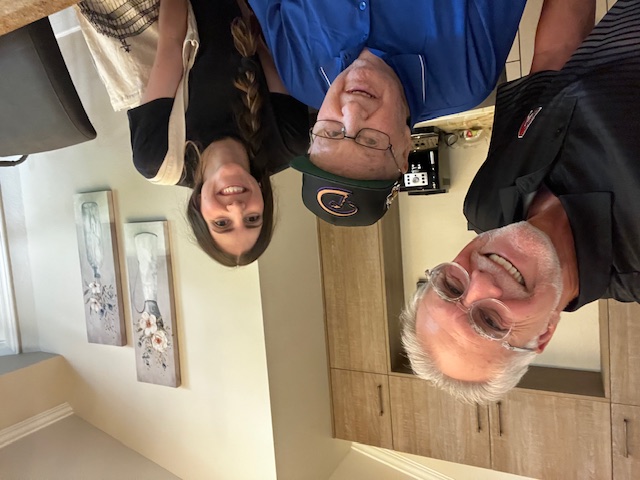Human Dignity: Reflections on My Dad’s Suffering
July 23, 2024

I was recently at a dinner where the conversation turned to human suffering. I do not remember why the conversation took that turn, but I was gathered with colleagues. Some, knowing I’m a Christian, asked if human suffering ever made me doubt God. The Bible is filled with accounts of people who, in their conversations with God, express frustration and confusion about the state of the world. Issues such as disease, war and racism have led God’s people to question his presence amidst such suffering.
I admit I am not used to dinner conversations taking such a serious turn, but the question was offered with genuine curiosity rather than an accusatory tone. Certainly, the problem of human suffering has been contemplated for thousands of years, and I knew I wouldn't be able to provide a comprehensive academic answer. The simple answer to the question was that there are human problems I have no sufficient answer for as a Christian. At the same time, it has not led me to reject my faith or move to a position where I consider that God simply does not exist. While grappling with the presence of evil, it is equally important to acknowledge the presence of good. Why are there people who sacrifice their interests to help others? What drives them to do so if humans developed solely through an evolutionary process with no ultimate purpose? These questions are complex, and it is crucial to ask why good often emerges amid great suffering.
Earlier this month, I traveled during the heat of summer to Arizona to visit my family, something I told my mom I would rarely do. As many of you know, my father has Alzheimer’s disease and it has been progressing. At times he recognizes me but often he does not. My visits with him are characterized by reading books about animals, viewing pictures of family he no longer knows, and watching sporting events. There are no longer in-depth conversations, wisdom passed from father to son, or the ability to remember or dialogue about the past.

He lives in a nice home that has about eight people who are in a similar condition. Many of them simply sit every day and stare out a window or watch television. There are no visits from family or encouragement from outsiders. As I sat on that Saturday, watching my father drift in and out of sleep while we watched the European soccer championship, I found myself wondering, much like my colleague who questioned the nature of suffering, what the purpose of all this was. My dad, who was always so vibrant and engaging, no longer has that capacity. His world is simple, at least from what I can observe, and usually focused on the immediate – a book we look at, a game we watch, or a family picture on display. What purpose, then, do my visits serve? I have come to the conviction that my visits are more important to me, as God continues to work in my heart, than to my father. In real terms, I cannot discover what they mean to my dad because he cannot tell me. Would he notice if I was not there? The answer to that question will remain unknown.
In Psalm 13, David wondered aloud to God about his suffering.
13 How long, O Lord? Will you forget me forever?
How long will you hide your face from me?
2 How long must I take counsel in my soul
and have sorrow in my heart all the day?
How long shall my enemy be exalted over me?
3 Consider and answer me, O Lord my God;
light up my eyes, lest I sleep the sleep of death,
4 lest my enemy say, “I have prevailed over him,”
lest my foes rejoice because I am shaken.
5 But I have trusted in your steadfast love;
my heart shall rejoice in your salvation.
6 I will sing to the Lord,
because he has dealt bountifully with me.
I am confident of this: My presence testifies to the fact that he is a creation of God, and whatever his condition, he needs the care of other humans. He remains my father, and he has dignity. He and my mother cared for me when I was unable to care for myself as a child, and he provided care for much of my life when I needed his help. The apostle James shares with first-century Christians in his letter that true faith is expressed in caring for widows and orphans, and one might add, our elders with infirmities. It is for those of us who are alive and able to carry those who cannot be carried themselves. So, do I know why he suffers from this disease? I do know that through my mother, brother, sister and me, we can alleviate and help redeem his suffering through our care. In that, we testify of God’s presence and of his creative capacity and love for humanity.
How long O Lord? I do not know, but like David I am confident that amidst the pain and suffering of this world, God is indeed at work restoring his creation. I see it in small things each day, and yes, even in my Dad’s smile. I do know, like David, that he has dealt with me and my family bountifully.